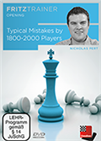"Beat the Heat" Open
Often we wonder what's the difference between a master level player, and the average club player. Is it about the depth of calculation? Evaluation of the position? Experience in the endgames?
 On this DVD GM Nick Pert shows you typical mistakes by 1800-200 players. Themes as when to exchange pieces, how to convert an advantage, passive pieces, anticipating your opponents plan, openings and pawn structure are shown throughout the DVD.
On this DVD GM Nick Pert shows you typical mistakes by 1800-200 players. Themes as when to exchange pieces, how to convert an advantage, passive pieces, anticipating your opponents plan, openings and pawn structure are shown throughout the DVD.
These are in fact many factors which are important. National Master Shanmukha Meruga (NM) graciously shares his last five games in a local weekend open tournament held at the Chess Club and Scholastic Center of Atlanta, on August 25th-26th.
GM Finegold (pictured) runs tournaments very professionally, and most of all pays prizes immediately!
Here in the USA small tournaments like this one have on the order if $600 as first prize, giving a young adult a chance to earn some money from chess while being a full-time college student.
Then, of course, there are other forms of income like private chess lessons, camps for kids, teaching chess in schools, etc.
NM Meruga won with 5 out of 5. When he was commenting on his games, I couldn't write down everything he was saying, because he was running like a train! In fact, just a couple of hours after the tournament was over, he was already giving chess lessons. However I think I captured most of his thoughts and analysis, and I wanted to share them with ChessBase readers because one of the keys to improvement is definitely going over well-annotated games.
Final standings

Williams main teaching method behind this set of two DVDs is to teach you some simple yet effective set ups, without the need to rely on memorising numerous complicated variations.
Personally while going over the games I was puzzled by the speed of his analysis, how well he remembered them, and how deep they would run sometimes. Showing me calculation is very important. I admit I couldn't understand if his brain is simply faster than mine, or if I need to exercise more, watching master level games, and guessing the moves, like NM Meruga did for years. I was also awed by his opening knowledge, which I was able to match thanks to reviewing many ChessBase DVDs. I realized he is fluent, like with languages, in many more pawn structures and relative middlegame plans, compared to the ones I know.
And then, of course, there was the realization about rook endgames. Most of the games were won in rook endgames, showing clearly that one needs to practice them in order to achieve mastery. There is no shortcut! Do the rook endgames, or don't complain about lack of improvement!
Here are the games analysed. Please try to gain some insight from each one. The games are not engine-like, or 2700-level, but they show what happens in real amateur tournaments. Thanks to the ChessBase game viewer, one can click on the engine if one line wasn't deep enough to understand the evaluation given.
Williams main teaching method behind this set of two DVDs is to teach you some simple yet effective set ups, without the need to rely on memorising numerous complicated variations.
Links
























